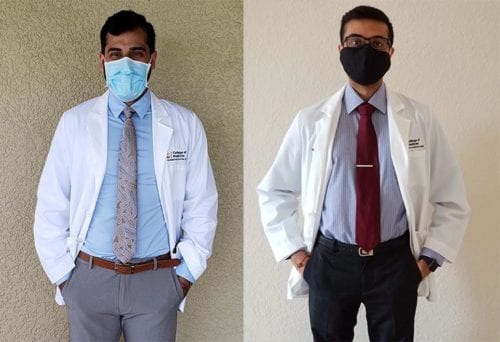
A year ago, no one would have considered a birthday party or singing in a church choir a dangerous, potentially deadly activity. But COVID-19 shows us that such events can be “super spreaders” that allow one or two sick people to infect dozens. In this week’s health tip, College of Medicine students Neel Shah and Deep Gandhi offer their perspectives on the importance of physical distancing, especially as UCF students return to our campus.
We get it. No one thinks a great college experience is sitting alone in a dorm room, apartment or at home with your parents. By nature, humans are social creatures and college life is often focused on group activities, events and partying. But if we are going to get through this pandemic and return to “normal,” we all have to do our part. And that means asking yourself, “Is partying more important than my health, my life, and the health and life of the people I love?”
If you think we’re exaggerating, remember that COVID-19 spreads in respiratory droplets. It’s easy to understand how droplets spread when we sneeze and cough. But they also spread when we’re talking. The truth is, we breathe each other’s air – especially when we’re in close proximity indoors.
Fortunately, many of us are wearing masks in public, but we don’t wear them when we’re eating and drinking – and probably don’t when we’re gathered casually with friends. And that’s the problem. Do you really know the friend you just shared a drink with isn’t infected or that everyone partying over pizza and beer at your house party is COVID-19 free? How sure are you that the buddies you’re arguing with about that awful football penalty aren’t spreading COVID-19?

Scientists know that speaking spreads the virus more than just breathing. And when you’re yelling and projecting, like at a party or while watching an exciting game on TV, you’re spreading more respiratory droplets. The same is true when you’re singing. One of the nation’s first diagnosed super spreader events was a choir practice in Washington State. One person who thought they had a cold spread COVID-19 to 52 other people during a 2½-hour practice.
The CDC estimates that about 40 percent of coronavirus transmissions occur before the infected person has any symptoms and that symptoms take an average of six days to begin. How many people do you encounter in six days – especially if you’re partying?
Many super spreader events involve indoor parties and the consumption of food and alcohol. Let’s be honest. People don’t socially distance when they’re drinking. And when you’re partying, it’s usually loud – so you’re talking louder, which means you’re spreading more respiratory droplets. If you’re inside, you’re in close proximity to others – think of the lines that always happen at the bathroom and the refrigerator.
That was the case in Carollton, Texas in May, when a family held a surprise birthday party with 25 guests. The host, according to media reports, had COVID-19 and didn’t know it. Eighteen people were infected at the birthday party. One died.
Seemingly innocuous activities can still possess a significant risk of acquiring COVID-19. According to the Texas Medical Association, on a scale of 1-10, the risk of eating at a restaurant indoors is ranked as a 7, going to the gym is an 8, and going to a bar is a 9. Bars may be closed for now, but there is still higher risk when people get together in groups of more than five – especially when they are eating and drinking.
We all saw young people on spring break in South Florida. They were packing the beaches in the early days of the coronavirus. They said COVID-19 wasn’t going to keep them from having a great time. If they got sick, some said, they got sick. They’d take the risk.
But the truth is, you’re not the only one at risk. In a pandemic, not practicing social distancing or any other precautions isn’t a victimless activity. Maybe you won’t get seriously ill from COVID-19. But what about the cancer survivor you happen to breathe on before you feel sick? What about your elderly grandparents? What about that buddy who was arguing at the party about the blown football call who happens to be asthmatic? We’re still learning the long-term health complications of getting COVID-19. Sure, you’re healthy now, but do you want to take a chance on your future health?
We all need to remember that our actions have lasting consequences not only for ourselves but also for those around us. No one who went to that choir practice or that birthday party thought they were going to get seriously ill or die. By far the best way to prevent the spread of infection is by refraining from physical contact. Wearing a mask can reduce the risk, but a mask doesn’t make you invincible. Combating this virus has to be a collaborative effort. So join the team. Don’t put yourself at risk of being a super spreader.
COVID-19 health tips are brought to you by UCF’s Academic Health Sciences Center (AHSC), which includes the Colleges of Health Professions and Sciences (CHPS), Medicine, Nursing and Student Health Services.
Post Tags
- covid covid-10 flu health tip how to interact students superspreader tip wellness tip
